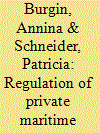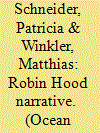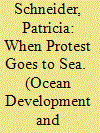| Srl | Item |
| 1 |
ID:
139202


|
|
|
|
|
| Summary/Abstract |
The use of private military and security companies (PMSCs) has become an increasingly popular measure to counter maritime piracy. This article examines how two established maritime nations, Germany and Spain, have approached the regulation of maritime PMSCs. The article demonstrates that there are similarities but also significant differences between the two regulatory systems and concludes that the governance frameworks that emerged are tailored to the needs of each state. While Germany underwent a long process to establish a sophisticated licensing scheme specifically designed for maritime PMSCs, Spain swiftly applied the framework that governs PMSCs active on land to those companies operating at sea.
|
|
|
|
|
|
|
|
|
|
|
|
|
|
|
|
| 2 |
ID:
121483


|
|
|
|
|
| Publication |
2013.
|
| Summary/Abstract |
The pirates of Somalia pose a major challenge for the international community, both economically and morally. Somali pirates try to legitimize their actions by reference to a number of arguments that appeal to the international community. Allegedly, the illegal fishing and waste dumping in Somali waters were the triggers for piracy. Hence, the pirates want to protect their coasts. These various strands form the so-called legitimacy Robin Hood narrative. In this article, this narrative is critically examined. The analysis includes a discussion of justice theories and related claims based on the works of John Rawls and Thomas Pogge. This is followed by a discussion of the justification of violence using Nicholas Fotion's irregular just war theory.
|
|
|
|
|
|
|
|
|
|
|
|
|
|
|
|
| 3 |
ID:
175491


|
|
|
|
|
| Summary/Abstract |
The article applies social movement theory to piracy and terrorism as a common conceptual roof, contextualizing and theorizing these phenomena. The cases of Nigeria and Somalia were chosen because pirate and terrorist groups are or have been active in the maritime domain in both countries, posing a problem for the international shipping community. In addition, these cases are special insofar as pirate and terrorist groups in these countries have used powerful narratives to underpin an attitude of social protest to legitimize their violence. The article critically examines whether the characteristics and modes of social movement theory apply to these cases and outlines the possible benefits and limits. It further includes perspectives from other conceptual frameworks from philosophy, sociology, and psychology. The analysis concludes that the concepts can add to our understanding of the phenomena of maritime violence. It helps us to view these groups not merely as risk factors and addressees of security governance but through the lens of social protest and the mechanisms and dynamics outlined by social movement theory.
|
|
|
|
|
|
|
|
|
|
|
|
|
|
|
|